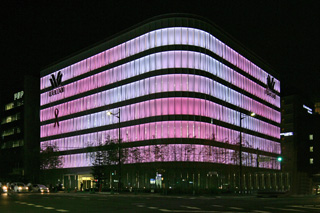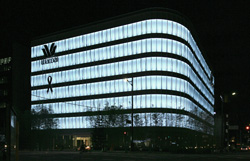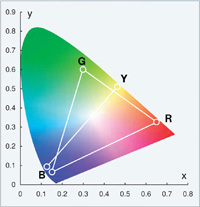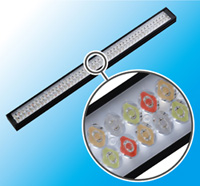Kyocera announced that its LED technology is being utilized in a facade lighting system to showcase the New Kyoto Building of Wacoal Holdings, Japan’s leading creator of intimate apparel for women. Completed last month, the system illuminates the building every night.
Kyocera’s high-color-rendering LED lighting, which combines violet LEDs with phosphors and proprietary optical technologies, creates delicate illumination in a wide range of colors. The system designed for the Wacoal building bathes its facade in an elegant gradation of hues suggestive of Kyoto.
 |
 |
|
Wacoal’s New Kyoto Building, with its delicate and beautiful changing colors |
Facade lighting in normal mode
The facade lighting’s normal mode is a soft white, reminiscent of natural silk (right photo). The illumination with changing colors occurs nightly in periods of about 5 minutes recurring at 30 minute intervals (left photo). (All photos courtesy of Kyocera)
|
The facade lighting system is the first in Japan* to operate by modulating red, blue, green, and white light generated from violet LEDs. Furthermore, the building features an environmental design with a 36kW Kyocera solar power generating system installed on its rooftop. This system is estimated to generate enough electricity to power the facade lighting for approximately three to four hours a day.
About Kyocera’s high-color-rendering LEDs
By combining violet LEDs, RGB (red, green and blue) phosphors and optical design technology, Kyocera’s high-color-rendering LEDs produce light which is extremely close to natural sunlight. Since the light includes a wide range of colors within the visible range, it facilitates accurate color rendition that is difficult to achieve with conventional LED lighting.
|
This unique feature has brought Kyocera’s high-color-rendering LEDs into many diverse applications — including display lighting for fine-art museums, surgical lighting, color-inspection lighting for industrial processes, and illumination for Japan’s revered ancient shrines and temples. Based on its expertise mainly cultivated in Japan, the company has started to provide LED modules in other markets that have a culture of valuing the quality of light for specific applications. Kyocera will present the LED modules from 8 to 11 November at electronica 2016 in Munich, Germany (Hall A3, Booth 241), the world’s leading trade fair for electronic components, systems and applications. In addition, the company will introduce them at ForumLED Europe 2016 in Lyon, France, a global event for LED lighting from 8 to 9 December.
|
|

|
|
CIE Chromaticity Diagram. |
|
While conventional LED lighting technology (based on blue LEDs that use yellow phosphors) produces colors only within the straight line between B and Y in the CIE Chromaticity Diagram, Kyocera’s violet LEDs with RGB phosphors can produce any color within the R-G-B triangle.
About the Wacoal facade lighting
|
The facade lighting was designed by Japanese artist Kyota Takahashi to express Wacoal’s corporate image through the concept of “a veil of silky light.” Using the expanded color capabilities of Kyocera’s high-color-rendering LED technology, the system produces an elegant white glow reminiscent of shimmering silk. Kyocera’s LED light fittings are installed on 72 windows from the second to seventh (top) floor on the building’s two sides facing the nearby thoroughfare. These 432 light fittings in total connect to a main controller to produce dynamic facade lighting with soft colors that blend with the Kyoto cityscape. The facade lighting’s normal mode is a soft white reminiscent of natural silk, which changes to Wacoal’s corporate color for a period of about five minutes on the hour. At the half-hour, for another period of about five minutes, the illumination changes to hues evoking the 24 solar terms of the traditional East Asian lunisolar calendar.
|
|

|
|
Kyocera’s LED light fitting. |
|
* Japan’s first facade lighting utilizing violet LED-based four-color modulating technology (as of September 2016, based on research by Kyocera).





 CN
TW
EN
CN
TW
EN









